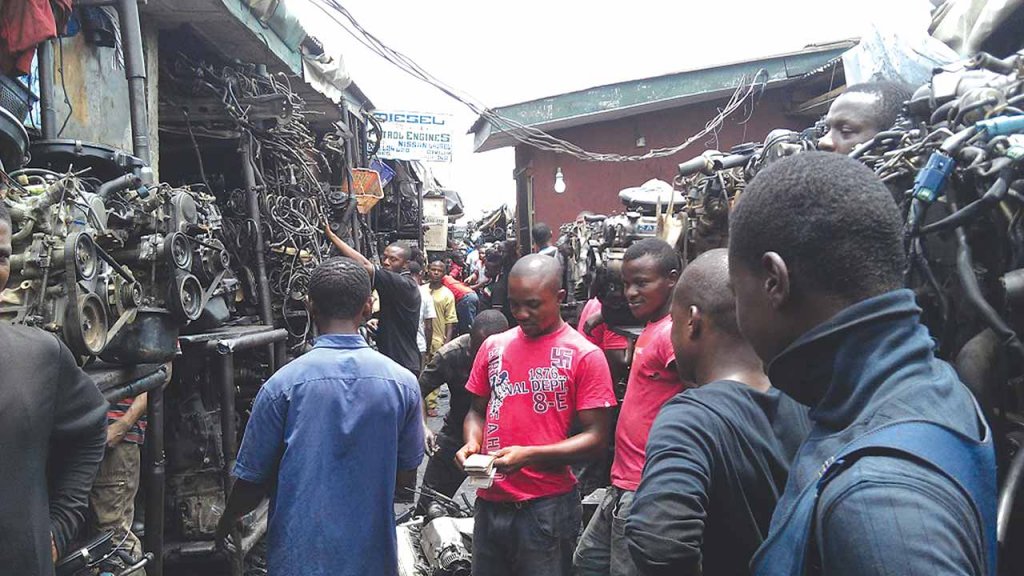The Nigerian automobile industry is saturated, birthing a good number of traders, engineers and other auto artisans. EMMANUEL MONYEI peeps into the world of these ‘autopreneurs’
With about 14 million cars plying roads across Nigeria, including the five million private cars and about 220,000 commercial vehicles in Lagos State, those with free enterprise spirit eke out a living from mechanical engineering and sale of spare parts.
Forget the ‘dirty’ nature of used parts retail business; the lucrative nature could blow minds. Dealers make as much as 200 per cent profit, as, according to them, used goods don’t have fixed value.
A brake expert, Mr Adedoyin Adekanye, who practises his trade at Owode market in Ikorodu, is of the view that ‘autopreneurship’ is the place to make a living.
He told Africana Entrepreneur, “The trade is very profitable, as every part of a vehicle has its expertise. As you can see, I am a brake master. There are other people who specialise in otherareas. The vehicle compartments are much; that is why I advise anyone who wants to pick up a trade to go for auto mechanic, as it can take care of one’s needs.”
This business seems to run in his family. His father was an overhauling mechanic, while his son, Omotayo, was learning auto electrical.
According to Adekanye, autopreneurship has made a lot of people in Lagos. He added that “auto mechanical engineering pays more than most white collar jobs.”
The capital-intensive nature of the spare parts retailing aspect of the business discourages many who would have ventured into it. This boosts the apprentice culture popular in south-eastern Nigeria.
An auto spare parts dealer at Ladipo Market, Friday Akhagomah, gave credence to this.
“You don’t start auto spare parts business with chicken pea. That is why most people have to serve and learn the tricks of the business from a tycoon who in turn settles them after some years of loyalty and service.
“I spent 13 years with my oga (master) before I finally gained my freedom, and he settled me with my first shop in the second line there. It is three years now since I had my freedom and I have been able to own two shops, which I use to take care of my family here in Lagos and in the village. I have a car,” he offered.

Akhagomah, who said he made an average profit of N15,000 daily, added, “Our market (Ladipo Market) is known to have any spare part you need. There is always an inflow of customers even from neighbouring states.”
He asserted that the nature of roads in the country, ironically, boosts the business.
“As vehicles develop faults, they need to be fixed and bad parts replaced. So, auto mechanic engineers and spare parts vendors come in handy,” he said.
When asked how he could certify the authenticity of products, he stated, “All my items are ‘Belgium’ (a term used to describe European used goods). I don’t buy China-made (term for inferior materials). You see, Belgium goods last longer; that is why in this market, people refer customers to my shop, as they know that I sell authentic materials.
“My oga would always say that what keeps a businessman in business is the ability to stock quality products at affordable prices. Though China-made goods are good, they don’t last long; that is why I don’t settle for them when I go to re-stock.”
An engineer with Elizade Motors, who identified himself simply as Chinedu, said that efficiency in autopreneurship was a product of theoretical and practical training. He stated, “The best engineers are the ones with both practical and theoretical knowledge.”
He reportedly graduated with a B.Sc in Mechanical Engineering from Ahmadu Bello University. While in the university, he learnt automobile overhauling, and by the time he was through with his National Youth Service Corps assignment, he learnt the electrical aspect of automobile engineering.
“This basic knowledge has made me a better engineer than my colleagues in the field,” Chinedu said.
He added that aside formal education, the passion and love for the profession should come first. “There are lots of Mechanical Engineering students and apprentices without the passion for it. It might be as a result of suggestions from family members or societal pressure. That is why you see a lot of people go into it and don’t succeed.
“Although we all know that success is from God, hard work is needed to get to the pinnacle of glory.”
According to him, no mechanical engineer should complain of low income, as the amount of cars that ply Nigerian roads, coupled with the bad roads, makes the business worthwhile.


